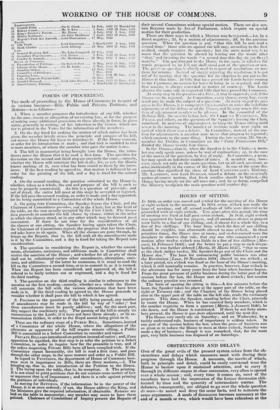HOURS OF SITTING.
IN 1606, an order was moved and settled for the meeting of the House at eight o'clock in the morning. In 1614, seven o'clock was made the hour of' meeting; and all second readings of bills were directed to be proceeded with at eight o'clock. Ten years after this period, the time of Meeting was fixed at half-past -seven o'clock. In 1C41, eight o'clock was'appointed the hour for prayers, and all members absent at prayers were liable to a fine of one shilling, and, if absent for *a whole day, to a fine .of five shillings. The hoar from which the fine -of one shilling should be exigible, was afterwards altered to nine o'cloek. In those primitive times, the House rose at noon ; and so determined were the members to observe that rule, that any one who commenced a new motion after twelve o'clock was liable to a fine of five shillings [Mer- curii, 14 Februarii 1643] ; and time better to put a stop to such irregu- larities, it was further ordered [Maras 21 1647], that so soon as the clock strikes twelve' Mr. Speaker do go out of' the Chair, and the House rise." The hour for commencing public business was after the Revolution [Lance, 19 Novembris 1694] altered to 'ten o'clock ; at a later period, ten o'clock was fixed as the hour of the House's meeting, which it still nominally remains. In practice, however, four o'clock in the afternoon has for many years been the hour when business begins. From the great pressure of public business during the latter part of the session before the last, the House met at three o'clock; last session the ordinary practice was resumed.
The form of opening the sitting is this—A few minutes before the hour, the Speaker takes his place at the upper part of the tumble, on the right or Treasury side ; and the Chaplain of the House being placed also at the upper part of the table on the left side, reads the customary prayers. This done, the Speaker, standing before the Chair, proceeds to count the 'House. When he has counted forty members, which is the number requisite to form a quorum [Maras, J Januarii 1640], he sits down, and the House is constituted. If there be not forty mem- bers present, the House is ipso facto adjourned, until the next day. The House very rarely sits on Saturday; and on Wednesday, by a tacitly understood rule, business of importance is seldom taken. In one part of the session before the last, when the press of business was so great as to induce the House to meet at three o'clock, Saturday was made a day of business ; though it was remarked, that, for the most part, very little business was disposed of on Saturdays.


















































 Previous page
Previous page